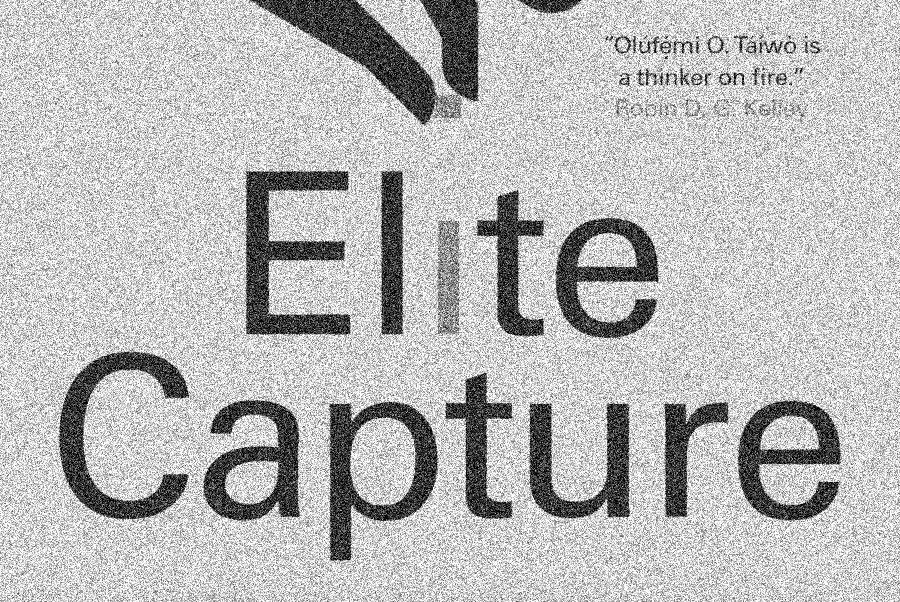"Uncaptured" Identity Politics is No Substitute for a Politics of Class
Olúfẹ́mi O. Táíwò’s Elite Capture: How the Powerful Took Over Identity Politics (and Everything Else) argues that we can free identity politics from its “elite capture.” But why not simply pursue a politics of class?

One of my strangest hobbies is arguing with libertarians. I’ve probably participated in a couple of dozen debates with various libertarian pundits, philosophers, and economists since 2019. There are very few arguments in defense of “free markets” I haven’t heard at least once.
Some libertarians like to insinuate that anyone who ends up on the bottom end of capitalism’s inequalities must have it coming. Perhaps they didn’t work hard enough, or they aren’t sufficiently talented, so it’s only fair that they acquire fewer resources. Others acknowledge that sometimes people get the short end of the stick through no fault of their own, and that this can be very sad. Even so, they urge, this is the price we pay for economic freedom.
Perhaps the most popular libertarian response to the iniquities of actually existing capitalism, though, is to insist that the fault lies not with capitalism itself but with “crony capitalism.” A hypothetical “clean” capitalism would surely have wonderful results.
I kept thinking about this dodge while reading Olúfẹ́mi O. Táíwò’s Elite Capture: How the Powerful Took Over Identity Politics (and Everything Else). Táíwò takes it for granted that the problems with actually existing identity politics begin and end with “elite capture.” He seems to regard the merits of an uncaptured version of left-identitarianism as too obvious to require much of a defense.
The decades preceding the publication of Elite Capture have seen the publication of a significant body of work by left-wing critics of identity politics per se (and not just its “capture”). You’d expect an academic philosopher like Táíwò to relish the opportunity to engage with these arguments. Instead, he simply ignores them. You can search the index of Elite Capture in vain for any mention of Adolph Reed, Toure Reed, Walter Benn Michaels, Cedric Johnson, or Vivek Chibber. This omission is not a matter of Táíwò simply making different judgments than I might about which left critics of identity politics have made substantial enough critiques to require a response. In the book’s 121 pages, he finds plenty of time for long stretches of narrative biography of various authors and revolutionaries he admires, as well as a very long digression about how the structure of video games is similar to the structure of real-world social interactions.
But he only brings up two contemporary critics of identity politics by name, and neither gets more than a fleeting mention. One of those two is conservative journalist Saagar Enjeti. The only left-wing criticism of identity politics mentioned in the whole book is one that appeared on a Trotskyist website. If you go back and read the original Boston Review article that Táíwò expanded into Elite Capture, you’ll find two more mentions of specific critics of identity politics. One is the anonymous author of an eight-paragraph item in the right-wing outlet Spiked. The other is Whoopi Goldberg.
While I tend to think that intellectual hygiene is better served by naming names (if only because doing so makes it harder to caricature people’s arguments), I’ll acknowledge that this would be a fairly petty complaint if Táíwò had responded to the substance of what the critics are saying, even without attributing the criticism to anyone in particular. But he just doesn’t.
Identifying the Substantive and Worthy Critiques
In the three years since Elite Capture was published, it’s become a touchstone for writers who want to advance the “captured identity politics bad, uncaptured identity politics good” position. Musa al-Gharbi, for example, highlights and praises Táíwò’s distinctions in We Have Never Been Woke: The Cultural Contradictions of a New Elite. Freddie de Boer, who in many contexts I would list as one of my favorite left-wing writers, approvingly quotes Táíwò half a dozen times in his own How Elites Ate the Social Justice Movement. The edition of Elite Capture I read starts with pages of glowing blurbs from everyone from Ibram X. Kendi to Robin D.G. Kelley to Daniel Denvir. The blurb from philosophy professor and superstar of resistance liberalism Jason Stanley assures readers that Táíwò will walk them “through the morass, deftly explicating the distinction between substantive and worthy critique and weaponized backlash.”
But again, many critics you might expect to see Táíwò engage with apparently don’t make the “substantive and worthy” list. Who does?
In his 1957 book, Black Bourgeoisie, sociologist Edward Franklin Frazier says that, when given the opportunity, “the black bourgeoisie has exploited the Negro masses as ruthlessly as have whites.” Citing this passage, Táíwò avers that it “surely overstates things”, but he goes on to praise Frazier’s book as a whole for offering “a crisp depiction of elite capture that remains valuable.”
Before looking at the elements of Frazier’s book that earn Táíwò’s praise, it’s worth pausing on that “surely.” A Marxist analysis of economic exploitation would predict that the degree of exploitation at a particular time and place will largely be a function of the material incentives of the exploiters, the capacity of workers to effectively resist, and so on, and that sentimental racial solidarity is unlikely to meaningfully temper these dynamics. Perhaps Táíwò disagrees, or perhaps whatever he has in mind is orthogonal to this point. Either way, it would be nice to hear an explanation of why Frazier is overstating things. Instead, Táíwò treats the overstatement as self-evident (“surely”) and moves on to “the crisp depiction” that “remains valuable.”
The main point Táíwò extracts from Black Bourgeoisie is that advocates of black racial uplift tend to conflate the interests of elites within the black population for the interests of the population as a whole. So, for example, the black press of Frazier’s time celebrated the election of a black doctor to head the American Medical Association as a great victory, despite the fact that the doctor in question opposed socialized medicine (which would benefit the majority of black people). This is indeed a substantive and worthy critique of actually existing forms of racial identity politics in Frazier’s era, and it would be easy to find numerous similar examples in our own time. But Táíwò assumes without argument that consideration of this sort of thing only adds up to a reason to want a better form of identity politics rather than a reason to orient radical politics around something other than identity.
Táíwò’s understanding of “elite” is extraordinarily capacious. Far from being limited to the top 1%, or even top 20% of the wealthiest or most powerful members of the population (never mind some more strictly defined entity like the capitalist class), any member of a group that’s advantaged in any way relative to other groups can be counted as “elite.” Hence, white people as a whole can be counted as part of a certain kind of “elite” in his worldview (which would, I have to say, be a fascinating thing to see a black college professor or New Republic writer explain to, say, a homeless white man). In fact, in one of the oddest passages in Elite Capture, any Twitter user with a lot of followers is classified as a member of an “elite,” since such users’ posts “get engagement and attention, structuring which topics are trending, who Twitter’s ‘main character’ is for the day, and thus which topics are on the conversational agenda.” This understanding of “elites” lets Táíwò fold the problem that Frazier worried about (the black bourgeoisie’s interests being conflated with those of the black population as a whole) into a problem so much larger and less tractable that the original point just disappears. In any group of human beings, whichever members have more resources or power or are more popular or more esteemed within the group will have more influence on the group. That problem, Táíwò concludes, is “as old as politics itself” and certainly isn’t “confined to a particular politics of social identity.”
Fair enough. But perhaps instead of joining Táíwò on this hasty flight into absolute generality, we could linger a little longer on the particularities of identity and class.
Identity Politics, Captured and Uncaptured
Táíwò makes one very reasonable criticism of the norms within many progressive spaces whereby white participants, for example, are encouraged to step back and defer to the opinions of black participants, men are encouraged to step back and defer to the opinions of women, and so on. He seems to be at pains not to be too critical of such norms, and he certainly doesn’t pause to worry about how deeply alienating this kind of thing can be to anyone not already socialized into a very particular kind of middle-class progressive outlook. But he does make the point that no amount of deferring to the perspectives of people in a particular room who come from less “privileged” backgrounds than other people in those rooms can account for the perspectives of all the people who lack the privilege of being in the room in the first place. There’s a danger here of taking the perspectives of, for example, female academics who go to activist meetings as a stand-in for the perspectives of women as a whole, given that their priorities might be very different from the typical priorities of poor and working-class women.
This ties back to the more general conclusion that Táíwò draws from examples like the ones discussed by Frazier:
When elites run the show, the interests of the group get whittled down to what they have in common with those at the top, at best. At worst, elites fight for their own narrow interests using the banner of group solidarity.
Given Táíwò’s insistence that nothing about this has anything in particular to do with “a particular politics of social identity,” he’s left with the conclusion that the solution to this problem (when it does arise within a particular politics of social identity) is just identity-based political organizing that manages to resist what he frames as the absolutely general tendency of “elites” to capture absolutely everything.
But a more basic question would be: if the goal is to serve the interests of the less privileged members of identity groups, why not organize around the interests per se rather than the identity categories that bind those who possess those interests to those who don’t? Frazier was and Táíwò is surely right that a majority of black people would benefit from socialized healthcare, for example. Similarly, a majority of black people would benefit from higher wages, more union density, and so on. As luck would have it, a majority of white people would also benefit from these things, as would a majority of non-white and non-black people. So, why not focus on organizing along the basis of these shared material interests (interests which, in any class society, are generated by class position)?
In the introduction to his indispensable book Class Notes, Adolph Reed, Jr. notes that one possible objection to this view is “that class is itself an identity and that class politics is, therefore, also an identity politics.” He concedes that this is true as far as it goes. Workers can identify as members of the working class. Of course, class is more than just an identity category, and there are important distinctions between class position and other kinds of “identities”, but Reed puts all that to one side for the sake of argument.
Even without elaborating that theoretical argument… there is a pragmatic justification that is sufficient for taking class as the identity around which to organize. The goal of building a mass movement—and there is no way other than such a movement to pursue progressive social transformation with any chance for even partial or contingent success—requires proceeding from those identities that unite as much of the society as possible around a vision and program that most directly challenge the current power relations. For the vast majority of people in this country—of all racial classifications or identities, all genders and sexual orientations—the common frame of reference is the employment relation, the fact of working, or being expected to work, a job. Moreover, the concerns and aspirations that are most widely shared are those that are rooted in the common experience of everyday life shaped and constrained by political economy—for example, finding, keeping or advancing in a job with a living wage, keeping or attaining access to decent healthcare, securing decent, affordable housing, pursuing education for oneself and intimates, being able to seek or keep the protection of a union, having time for quality of life, being able to care adequately for children and elders, having access to good quality public services and social infrastructure.... A politics focused on bringing people together around such concerns and the objective of collectively crafting a vehicle to address them is a politics that proceeds from what we have in common.
How might Táíwò respond to this kind of pragmatic argument? We’re mostly left to speculate, since Reed’s criticisms of identity politics (unlike those of Saagar Enjeti) are passed over in silence. I can find two hints, though.
One comes in the passage from Táíwò I quoted above, about how elite capture within groups means that the interests of any particular group will “at best” be “whittled down” to what people at the bottom of the group have in common with those at the top. Recall that Táíwò sees white people, men, straight people, Twitter users with high follower counts, and so on, as being “elites” in their own right, despite the obvious reality that many individual members of each of these groups will have fewer resources and command less power and even prestige than particular black people, women, gay people, and so on. The other hint comes in a passage where Táíwò says that, while he’d previously considered cases of identity-based movements being captured by their economically elite members, he could just as easily have reversed the variables. Hence, “instead of thinking about the class politics of racial studies, one could describe the race politics of class activism, where we might find that whites (racial elites) tend to capture the decision-making process of socialist organizations, labor unions, and the like.” This passage leads to a footnote referencing Michael C. Dawson’s book Blacks In and Out of the Left, but in the original Boston Review essay, it comes with a hyperlink to Miguel Salazar’s 2018 New Republic article “Do America’s Socialists Have a Race Problem?” This latter was a truly absurd hit piece about the Democratic Socialists of America (DSA), in which Salazar suggested that socialists who were hesitant to support Oakland Mayoral candidate Cat Brooks because Brooks had only recently stopped supporting charter schools (and activists of any kind generally learn to distrust politicians’ convenient last-minute reversals) were actually motivated to distrust her by anti-black racism.
What these hints add up to suggest is something like the assumption philosopher Amia Srinivasan makes explicit in her book, The Right to Sex: Feminism in the Twenty-First Century. “The central insight of intersectionality,” Srinivasan claims, “is that any liberation movement—feminism, anti-racism, the labor movement—that only focuses on what all members of the relevant group (women, people of color, the working class) have in common is a movement that will best serve those members of the group who are the least oppressed.” Like Táíwò, Srinivasan seems to take this as something like a self-evident truth, but a little reflection should be enough to show that it’s simply not true of the labor movement or class-based organizing more generally. Black Americans, for example, are more likely than white Americans to lack health insurance, less likely to go to college, more likely to have student loan debt if they do, more likely to struggle with childcare costs, more likely to have minimum wage jobs, and so on. To whatever extent we can then meaningfully speak of the interests of entire identity-based slices of classes, it’s simply not true that working-class white people, by virtue of being less oppressed, are going to be “better served” than working-class black people by universalist working-class movements for Medicare for All, tuition-free higher education, universal daycare, and living wages.
Was the Combahee River Collective a Good Model for Collective Action?
Táíwò’s central reference point for good, uncaptured identity politics is the Combahee River Collective, which he describes as “an organization of queer, Black feminist socialists” dedicated to “fostering solidarity and collaboration.” (Adolph Reed has less glowingly described Combahee as “never more than a glorified book club” that issued some statements.) According to Táíwò, the collective was the first group to popularize the term identity politics. This may be true. It certainly doesn’t follow, as he sometimes seems to insinuate, that they were the original font of such politics. Booker T. Washington, for example, probably deserves more credit there.
In any case, Táíwò emphasizes that Combahee believed in “constructive” politics, by which he just means having concrete goals, and advancing those goals through “diverse coalitional organizing.” One of the collective’s founders, Barbara Smith, decades later praised the Bernie Sanders campaign. So far, so good. I’m all for having concrete goals, working with lots of different people to achieve those goals, and voting for Bernie. But the particulars of the Combahee model are worth a longer glance. If we’re organizing as many people as possible for the purposes of constructive politics, why start with “collectives” exclusively open to subcategories of the population as small as black lesbians?
The original Boston Review essay ends with what’s apparently intended to be an inspirational example drawn from Combahee’s founders:
A set of… “consciousness raising” guidelines by Barbara Smith and fellow activists Tia Cross, Freada Klein, and Beverly Smith provides an example of identity politics work as the Combahee River Collective envisioned it. The exercise starts by asking participants to examine their own shortcomings (“When did you first notice yourself treating people of color in a different way?”), but ends by asking how they can use an element of shared oppression as a bridge to unite people across difference (“In what ways can shared lesbian oppression be used to build connections between white women and women of color?”). Because, in the end, we’re in it together—and, from the point of view of identity politics, that is the whole point.
So, white lesbians have to start with self-criticism sessions about their problematic attitudes before they even graduate, at the end of the exercise, to getting to “build connections” with black lesbians. At this point, perhaps, white and black lesbians, who together still make up a small minority of the U.S. population, actually get to work together with each other for “constructive” goals, but the road from there to assembling a version of “all of us” that actually represents a majority of the population sounds like it’s going to be very long.
Let’s call that Plan A. Plan B would be directly appealing to the working-class majority of the population on the basis of broadly shared material interests. I’m not sure what in the decades since Combahee held their meetings and issued their statements fills Táíwò with hope about the prospects for Plan A. But I have to say Plan B sounds a whole lot more promising.
■
Ben Burgis is a Jacobin columnist and the host of the podcast and YouTube show Give Them An Argument. He’s the author of several books and pamphlets, most recently Four Essays on Palestine.



